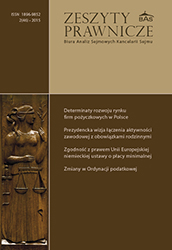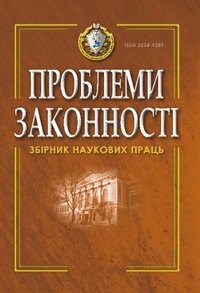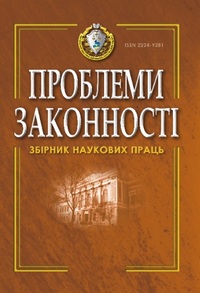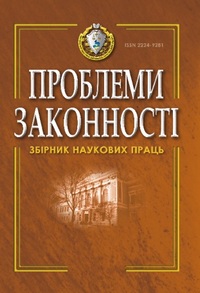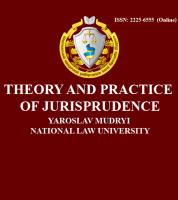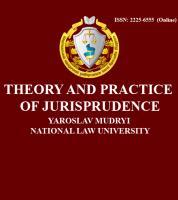Author(s): M. Ielnykova / Language(s): Ukrainian
Issue: 129/2015
Problem Setting. There is no doubt that the institution of human rights development degree in the country is the indicator of the development level of the state itself, and the proper mechanism for the implementation of the norms reinforcing the human rights, shows democracy, the rule of law, legality and the proximity of the state to being a rightful state. Despite the consolidation of human rights as statutory regulations in international instruments and the laws of separate states, they do not get proper implementation. Obviously, the only reduction of the human rights to the status of statutory regulations is not enough for them to "work" in a given society, so there must be a mechanism of their implementation.Analysis of the recent researches and publications. The problem of the implementation of constitutional and legal regulations governing the human rights was addresses by such scholars as: Y.u Barabash, L. Zavadska, Ye. Zakharov, O. Zaichuk, V. Kolisnyk, A. Kolodii, M. Koziubra, A. Lukashova, A. Oliinyk, V. Pohorilko, P. Rabinovych, V. Rechytskyi, A. Skrypniuk, T. Slinko, Yu. Todyka, M. Havroniuk, V. Yavorskyi and many others.Paper objective. The article presented aims to investigate the components of the problem of legal mechanism for the implementation and protection of the civil and human rights in Ukraine.Paper main body. The problems of the mechanism for the implementation and protection of human rights in the last quarter of the twentieth and early twenty-first century have become, without exaggeration, of the world, global significance and came in first place in the international system of the criteria for the evaluation of democracy development level in a particular country and around the globe. It is necessary to focus on the fact that the concept of the implementation of the human rights is closely connected with the concept of enforcement of the latter. The enforcement of human rights is defined as a system of their guarantee by public institutions operating in legal regime; this system includes the following elements: competence, protection, defense, creating the conditions for actual implementation by persons of their rights. From the information given above it follows that the implementation of the human rights falls within their enforcement, since a number of conditions of the last precedes the appropriate implementation.Conclusions. We can highlight the following issues concerning the rights of human and citizen: low level of legal culture and legal consciousness of the majority of our society members; unsatisfactory level of external educational influence on each person by the society and self-education in the possession by many people of the real sense of personal honor and dignity; low level of adherence to the rule of law (legality) in the society and the state and unconditional responsibility of every person, without exception, to themselves and the environment for the process and the results of their activities; inequality and branches of state and local governments and the imperfection of local self government and territorial communities functioning in real life; low level of professionalism in the political and public management and its exclusive reliance on personal and group (clan) interests; lack of clear structuring of the civil society and civil control over the activities of public authorities; high level of corruption at all levels and stages of public life and the lack of political will in its reduction; lack of direct mutual dependence between the human and the citizen and the state and the society without the liability of officers and the citizens themselves.
More...

